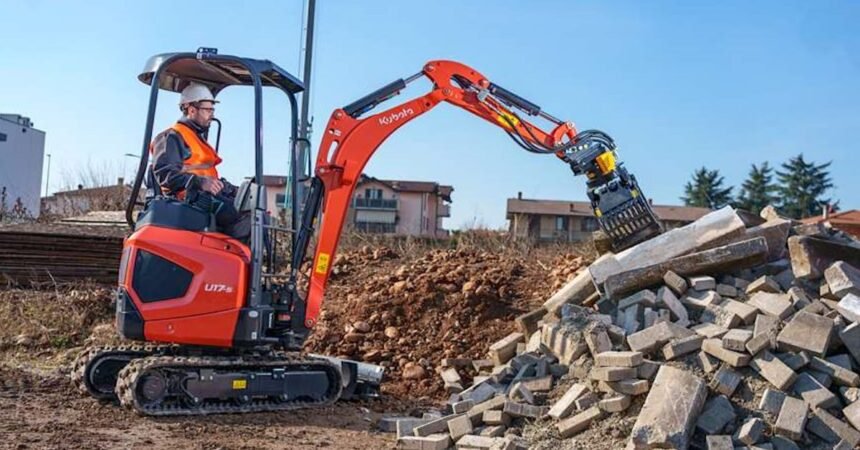Japanese equipment manufacturer Kubota made a splash at the 2025 bauma expo with the unveiling of 22 new or updated machines. However, it was a lesser-known addition that caught the attention of industry insiders – a retrofit kit designed to help existing customers decarbonize their fleets more efficiently and affordably.
In the world of construction equipment, the transition to battery electric vehicles can be a daunting task, with high upfront costs and economic challenges standing in the way. Recognizing this, Kubota has introduced a retrofit option that can be installed by a trained dealer in just one day.
Imagine transforming your diesel-powered Kubota excavator into a clean, electric machine with the installation of an 18 or 20 kWh lithium-ion battery pack and electric drive motors. This conversion opens up a world of possibilities for low-noise, low-vibration work environments where emissions are strictly regulated – perfect for indoor projects like precision demolition or historical excavation.
What sets Kubota’s retrofit kit apart is its flexibility. If the need arises, the excavator can easily switch back to diesel power, offering the best of both worlds. Similar to ZQUIP’s power solution, Kubota’s modular kit allows operators to choose between electric and diesel power based on their operational needs.
The company’s focus on sustainability is evident in its commitment to creating machinery that is not only flexible but also repairable and reusable. By offering construction fleet managers a longer operational lifespan, superior return on investment, and lower total cost of ownership, Kubota aims to set a new standard in the industry.
In addition to the electric retrofit, Kubota has made other enhancements to its excavators, including modern cab controls, a wider undercarriage for increased stability, and an independent travel circuit that allows operators to use various functions without affecting tracking performance.
The retrofit kit, first showcased at the Hillhead exhibition in the UK, is set to go on sale this summer, promising a seamless transition to electric power for Kubota customers. While pricing details are yet to be announced, the company’s focus on reducing maintenance costs, operational overheads, and offering an economical advantage through lower electricity costs is sure to appeal to construction firms looking to go green.
As the construction industry continues to embrace sustainable alternatives, Kubota’s electric retrofit solution stands out as a practical and cost-effective way to decarbonize fleets and reduce environmental impact. With the ability to switch between electric and diesel power, Kubota is paving the way for a greener future in construction equipment. The world of technology is constantly evolving, with new innovations and advancements being made every day. From artificial intelligence to virtual reality, there is no shortage of cutting-edge technology that is shaping the way we live and work. One such advancement that is gaining traction in the tech world is blockchain technology.
Blockchain technology is a decentralized, distributed ledger that securely records transactions across a network of computers. Each transaction is added to a block, which is then added to a chain of blocks, hence the name blockchain. This technology is most commonly associated with cryptocurrencies, such as Bitcoin, but its applications extend far beyond digital currencies.
One of the key features of blockchain technology is its transparency and security. Because the ledger is distributed across multiple computers, it is extremely difficult for any one party to alter the data. This makes blockchain technology ideal for financial transactions, supply chain management, and even voting systems.
One of the most promising applications of blockchain technology is in the realm of supply chain management. By using blockchain technology, companies can track the movement of goods from the manufacturer to the consumer in real-time. This not only helps to prevent fraud and counterfeiting but also improves efficiency and transparency in the supply chain.
Another area where blockchain technology is making waves is in the world of healthcare. By using blockchain technology, medical records can be securely stored and accessed by authorized parties, making it easier for healthcare providers to share information and provide better patient care. Additionally, blockchain technology can help to streamline billing and insurance processes, reducing administrative costs and improving overall efficiency in the healthcare industry.
Blockchain technology also has the potential to revolutionize the way we vote. By using blockchain technology, elections can be conducted securely and transparently, with each vote being recorded on a tamper-proof ledger. This can help to prevent voter fraud and ensure that election results are accurate and trustworthy.
Overall, blockchain technology has the potential to transform industries and improve processes in a wide range of applications. As more companies and organizations start to embrace this technology, we can expect to see even more innovations and advancements in the coming years. The future of technology is bright, and blockchain technology is leading the way.







